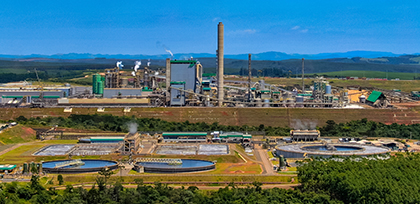Local development
Commitment to local development
Klabin has an economic, social, and environmental agenda with the communities where it operates, which includes projects for education and job training, family farming, regional solid waste management, and a program to support public management planning.
The Company seeks to identify impacts of industrial activity, aiming to mitigate them in order to have its operations within the highest standards of sustainability.
Acceptance survey
In the 2022 community acceptance survey, Klabin achieved an average approval rating of 83.6% in the municipalities where it operates, surpassing the 2030 Agenda (KSDG) target of 80% in four out of the six territories surveyed. The survey is conducted annually and its indicator corresponds to the average of eight dimensions: perception of impacts, economic development, environmental preservation, job creation, commitment, image, social stimulation, and business promotion.
The scope of the survey includes the Company's largest operations in the states of Paraná and Santa Catarina, as well as the cities of Paranaguá and Rio Negro (PR), Goiana (PE) and Angatuba (SP), totaling 25 municipalities.
In 2022, Klabin began to take into account the global indicator for managing the topic, calculated by the weighted average of the six territories. Paraná, for example, accounts for 44% of all interviews. Thus, the overall result obtained in 2022, of 83.6%, is four percentage points higher than in 2021, with evolution in all dimensions in the weighted average and greater emphasis on environmental preservation, commitment, social, and business stimulus.
The Company's challenge is to maintain the level of the approval rate already reached, analyzing the responses from each of the territories consulted. One of the issues identified as opportunities for improvement is the need to increase awareness of Klabin's activities in the communities, which can be achieved by reinforcing communication initiatives, for example.
Unit |
Target indicator (average 8 dimensions) |
Base (interviews) |
|---|---|---|
Paraná |
84.5% |
1,651 |
Santa Catarina |
85.3% |
844 |
Angatuba |
83.2% |
393 |
Goiana |
80.8% |
501 |
Rio Negro |
79.5% |
130 |
Paranaguá |
77.9% |
201 |
Klabin Total |
83.6% |
3,720 |
Impact management and engagement
The evolution of the community acceptance index is linked to Klabin's proactive, anticipatory, and ongoing management of the impacts of its operations in the territories. The Company works to prevent or reduce the negative impacts of its forestry and industrial operations, such as dust, unsafe driver behavior, poor road conditions, odors, and factory noise, among others.
The dust created by truck traffic the municipalities where Klabin has a forest operation is one of the primary concerns raised by the communities. The impact is monitored by the rate of complaints per kilometer traveled in communities (total complaints received divided by the total kilometers traveled in communities during the year), which was 0.9 complaints/km in 2022. Klabin’s goal is to eliminate dust complaints.
Even with the progress of the results, the Company is challenged by the growth of its operations, wich also expands the number of municipalities and communities impacted by its operation. The rate is 25% lower than that recorded in 2021, despite the expansion and increased distance of forestry activities in recent years, as well as the Puma II expansion in full operation.
The results indicate the effectiveness of mitigation measures. Examples include the humidification of roads, the use of a coating made up of successive applications of aggregate and bituminous binder, prior analysis for the optimization of transport routes with detours around communities, spot asphalting, and the installation of individual sprinklers on isolated properties.
The positive impacts of Klabin's actions are amplified through the creation of jobs, support for municipalities in public management programs, and the implementation of social projects, among other initiatives.
Klabin Social Demands
Since 2021, the management of social impacts has been enhanced through the deployment of a system in which all employees can register requests, complaints, questions, and suggestions from stakeholders. Klabin Social Demands (KDS) follows internal guidelines for handling and a review process for the demands, with the timeframe varying depending on the severity of each demand.
KDS was initiated in Klabin's operations in Paraná and was then expanded to units in Angatuba, Rio Negro, Goiana, Otacílio Costa, Correia Pinto and Lages. The Piracicaba, São Leopoldo, and Horizonte Units and the Figueira Project are the Company's next operations in line to receive the tool. In 2022, the system registered 733 demands, of which 515 were complaints. Of these, most referred to traffic violations, dust and poor road condition.
Social risk management
Before launching major projects, Klabin follows a methodology of collecting primary and secondary data from the territory and communities in the area of influence to assess the socioeconomic situation of the region where it has a forest and industrial base and the potential impacts of its operations. The Company has been taking action to strengthen its focus on human rights in assessments and, in turn, enhance the management of risks of this type.
In Parana, where Klabin concentrates significant operations, such as a maritime terminal in the Port of Paranaguá, Puma and the Puma II expansion project, the company, for example, already has a solid knowledge base regarding the territory, which allows for the correct sizing and optimization of the results of active social programs.
Puma II Programs
In addition to continuing the corporate social programs already established, such as Klabin Semeando Educação, Support for Public Management, Matas Sociais, and the Solid Waste Program, as of the execution of the Puma II Project, the Company strengthened initiatives to combat violence against women and children in the project's direct area of influence in the Paraná municipalities of Telêmaco Borba, Imbaú, and Ortigueira.
With the support of a specialized consulting firm, structured and high-quality training actions are being promoted to enable service networks to effectively address and combat this violence. The purpose of the initiative is to coordinate, integrate, and standardize actions and procedures between institutions, equipment, services, and programs that comprise the protection network and security and justice systems.
Klabin Semeando Educação Pgram, in the municipality of Congonhinhas, Paraná.
Traditional communities
Klabin identifies and implements measures to seek the protection of the rights of traditional communities (quilombolas, indigenous, and faxinalenses (wood gatherers)) located in a buffer zone of 10 kilometers from the forest management areas. This process is premised on the Free, Prior, and Informed Consent (FPIC) of the communities, and the Company's refusal of prospected areas that border or have an impact on the lifestyles of these communities.
Reports of these activities are regularly audited by certification bodies from banks financing the expansion projects (IFC, IDB), including field visits and interviews with affected communities.
Every two years, the forestry base is reviewed in relation to the mapping and, if necessary, new communities are included in the delimited space of the mapping. The consistency of information and in-depth knowledge of the presence of traditional peoples in the territory enables Klabin to establish closer and more meaningful dialogue with the communities and to include them more effectively in the activities undertaken by the Company.
Within a 10 kilometer buffer of Klabin's management areas in Paraná, Santa Catarina and São Paulo, 170 traditional communities have been mapped, including 101 faxinais (wood gatherers), 52 quilombolas and 17 indigenous lands. These communities were identified through studies conducted over the years and in accordance with the evolution of the Company's forestry base.
Learn more at:
Indigenous Environmental Basic Plan in Ortigueira
Indigenous Environmental Basic Plan in Ortigueira
Since 2017, the Company has been working with the Kaingang indigenous communities in the Queimadas and Tibagy-Mococa Indigenous Lands in Ortigueira (PR), as part of the Indigenous Environmental Basic Plan (PBAI). This plan was created as a requirement for the environmental license for the operations of the Puma Unit. Highlights of the PBAI initiatives include an audiovisual training program, which began in 2022, with the goal of supporting the Kaingang to strengthen their identities and their territorial and cultural heritage through audiovisual resources and a collaborative production between indigenous people and specialized professionals.
The Kaingang Ecological Corridors Program, however, has a dimension and scope directly related to the scale of the transformations that have taken place in the land ecosystems of the region since the installation of the Puma Unit and that continue during the operation of the venture. Since the program began in 2019, landscapes that are sources of biodiversity have been identified, restoration priorities have been set, and Kaingang ecological corridors have been delineated. In 2023, training will be provided to the indigenous people to facilitate the implementation of these corridors.
The creation and management of scholarships is also part of the PBAI, within the Kaingang Education and Culture Revitalization Program. Since its inception in 2017, the Program has trained 20 professionals in courses such as dentistry, pedagogy, nursing, nursing technician, secretarial, and cashier operations. Another 22 are still enrolled.

Intangible heritage
Klabin takes into account the impacts on intangible heritage when managing social risks, such as the traditional feast of Nossa Senhora do Rocio, which has been celebrated for over 200 years in Paranaguá (PR), where the company's Port Terminal is located.
A research study on the cultural and devotional manifestation and mitigation actions to address the potential impacts of the terminal on the intangible heritage of the festival was recorded in a report at the Institute of National Historical and Artistic Heritage (IPHAN) as a condition of the environmental licensing process for the venture. The initiatives proposed and approved by regional leaders, devotees, and Caiçara communities involved in the celebration include studies for urban planning and revitalization, the creation of an inventory of regional faith festivals, and the training of institutions in the development and management of socio-cultural projects.
The Paranaguá Port Terminal, in Paraná











